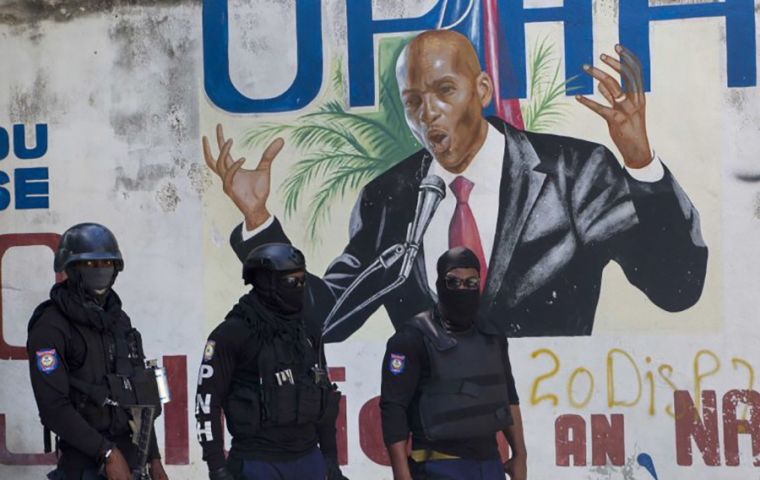MercoPress. South Atlantic News Agency
The mysterious killing of Haiti president Jovenel Moïse
 Haiti has lots of gangsters and hit men of its own, and two dozen white foreigners would stick out a bit.
Haiti has lots of gangsters and hit men of its own, and two dozen white foreigners would stick out a bit. By Gwynne Dyer – The presidential dogs were still alive, which meant that something was very wrong with the official explanation of the assassination of Haitian President Jovenel Moïse on July 7. In very poor countries even moderately prosperous people whose houses contain things worth stealing usually have large dogs, and those dogs are trained to attack intruders.
The dogs would certainly have attacked Moïse’s attackers if they didn’t know them, but they didn’t have a scratch on them. Neither did his bodyguards, who somehow didn’t hear the 12 shots that killed the president and the several more shots that severely wounded his wife. In fact, they heard nothing, saw nothing and knew nothing.
But the Haitian police rapidly arrested 15 Colombian ex-soldiers and killed three others. There were two Haitian-Americans with them, and six more Columbians are still on the run.
“Foreigners came to our country to kill the president,” lamented police chief Léon Charles.
Why would anybody import white foreigners to assassinate the president of a Black country? Haiti has lots of gangsters and hit men of its own, and two dozen white foreigners would stick out a bit.
In fact, have you ever heard of a hit team of more than two dozen men before? Yet that’s the story Moïse’s people are sticking to — which suggests that they might be involved.
The assassins allegedly arrived in two large groups in May and June, and spent their time hanging around a suburban hotel in Port-au-Prince. Then early one morning last week they went to the palace, killed the president — and returned to their hotels, where most of them were arrested peacefully some hours later.
In fact, have you ever heard of a hit team of more than two dozen men before? Yet that’s the story Moïse’s people are sticking to — which suggests that they might be involved.
The story told via their wives and families back in Colombia is a bit different. They say that the mercenaries were hired as bodyguards for some prominent Haitian (they didn’t know who) for US$ 2,700 per month.
They showed up in Haiti and got paid, but there was no actual work for them to do until July 7.
They were then handed an arrest warrant from a judge and told to go to Moïse’s residence, take him into custody, and bring him to the National Palace, where he would presumably be arraigned.
This might have been a tricky task, since it involved getting past the president’s guards, but oddly it wasn’t a problem. The Colombians’ leaders went into the president’s rooms, found Moïse dead and his wife wounded, and so they all left again, presumably telling the guards on their way out.
That story implies an incredible naïveté among the Colombian mercenaries, but in fact all the explanations on offer are incredible.
Assassins without an escape plan who, according to the security cameras, arrived at 2:40 a.m., an hour and a half after Moïse was killed?
A leading opposition politician says Moïse’s own guards did it.
Oh, and now the authorities have arrested Christian Emmanuel Sanon, a 63-year-old Haitian oligarch who flew into the country on a private jet in early June with “political motives.” Have they arrested the intellectual author of the killing? Is he just another patsy? And who is they anyway?
Don’t waste time wondering. It doesn’t matter.
Haiti has the vicious, convoluted, ultimately meaningless politics of a 16th-century Italian city state, with about the same standard of living (60% of the population under the poverty line, which is US$ 2.41 a day). It has the same riven, ruthless ruling caste, and the same levels of illiteracy, child labor and general violence.
This is just another turn of the wheel.
The puzzle of who killed Moïse and why may never be solved, although which candidate emerges victorious from the current cluster of three rivals claiming the presidency will be a pointer in the right direction. None of them will change the fact that the country is really run by the rich and the gangs, often in partnership.
Haiti is not a developing country. It is a society where two wealthy elites, one black and the other mulatto, compete for power but co-operate in oppressing and exploiting everybody else.
Together they amount to about three per cent of the population; almost everybody else lives in poverty, and most in ignorance as well. And there is no development.
Ursula Le Guin once wrote a short story about an extraordinarily wealthy and healthy city where everybody lived in peace and bliss, which was guaranteed to last so long a single child was kept imprisoned in filth, darkness and misery. Haiti is like that, except that 10 million must live in perpetual misery to guarantee the happiness of about 300,000.




Top Comments
Disclaimer & comment rulesCommenting for this story is now closed.
If you have a Facebook account, become a fan and comment on our Facebook Page!